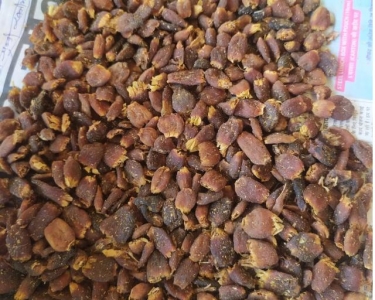Live animals
Couldn't find the product you want?
Fill out this form to request the product.
Products You May Like
Export from Madagascar
Madagascar, officially the Republic of Madagascar and previously known as the Malagasy Republic, is an island country in the Indian Ocean, off the coast of Southeast Africa. The nation comprises the island of Madagascar (the fourth-largest island in the world), as well as numerous smaller peripheral islands. Madagascar is the fourth largest island in the world, after Greenland, New Guinea, and Borneo. Although located some 250 miles (400 km) from the African continent, Madagascar's population is primarily related not to African peoples but rather to those of Indonesia, more than 3,000 miles (4,800 km) to the east.
Due to an underdeveloped industrial sector, Madagascar trade figures depend highly on agricultural productivity. Before the 1990s, the country had strong trade relations with the western nations. Later, the country developed strong ties with the emerging economies of Asia.
Madagascar's export: being a predominantly agrarian economy, cash crops dominate the country's export list. Some of the major Madagascar's export crops are coffee, sugar and vanilla. Apart from agricultural products, Madagascar exports petroleum products and chromite ore, graphite, chromite, shrimp.
France is the largest export partner of Madagascar. It accounts for a share of approximately 39% of the total export volume. The country has had healthy trade relations with France since the colonial era. Other major export partners are the US and Germany, which represent shares of 20.3% and 5%, respectively.
According to the International Trade Centre, the top export categories for Madagascar are:
- Articles of apparel and accessories
- Fish, crustaceans, molluscs, and aquatic invertebrates
- Coffee, tea, mate, and spices (Cloves, Vanilla)
- Mineral fuels, oils, distillation products, Titanium Ore, etc.
Major Trading Partners of Madagascar: the top countries to which Madagascar exports merchandise, are: France, United States, Germany, China, Singapore.
Madagascar's political crisis brought a shift in the country's export sheet. Previously a net exporter of apparel, Madagascar exports are now essentially agricultural and mineral.
Import to Madagascar
The Republic of Madagascar is an island country located in the Indian Ocean off the southeastern coast of Africa. The nation comprises the island of Madagascar (at 587,041 square kilometres), the fourth-largest island in the world), as well as numerous smaller peripheral islands, the largest of which include Nosy Be and Nosy Boraha (Ile Sainte-Marie).
Madagascar's trade imports stand at $1.836 billion approximately. The country ranks 153 in the world in terms of total import volumes. Madagascar has an insignificant industrial sector. Thus, the country has to import a large portion of the manufactured products it consumes. Major items of import for Madagascar are consumer goods, heavy machinery, capital goods and food.
China is the main import partner for Madagascar with a share of more than 20% in terms of total volume. Other major import partners are Bahrain, France, South Africa, the US and India.
Madagascar carries on a relatively small foreign trade, and the annual value of imports is usually higher than the value of exports. The main imports of Madagascar are capital and consumer goods, petroleum, and food products. The principal trade partners of Madagascar are France, the United States, and China. Madagascar relies heavily upon assistance from members of the European Union and international agencies.
According to the International Trade Centre, the top import categories for Madagascar are:
1. Boilers, machinery, nuclear reactors, etc.
2. Mineral fuels, oils, distillation products, Refined Petroleum, etc.
3. Electrical and electronic equipment
4. Articles of iron and steel
5. Vehicles other than railway, Cars, Delivery Trucks
6. Rice, Raw Sugar
The top countries which import merchandise to Madagascar, are China, United Arab Emirates, Bahrain, France, South Africa.
Check Out Export Portal: A Site That Lets You Export Live Animals
If you are looking to buy and export animals, then you came to the right place! Export Portal's Live Animals Department is an online marketplace for sellers and buyers of any livestock. We work to contribute to the live export industry, which brings many economic advantages and other benefits to countries that rely heavily on livestock imports. In fact, in just Australia alone, this industry contributes roughly $1.8 billion to the country's GDP each year. Moreover, it also ensures food security while helping people meet their protein needs as well.
Finding the Right Animal
We feature a wide range of pigs, cows, sheep, goats, horses, rabbits and hares, turkeys, bees, and fish for sale. An increasing number of American, Australian, German, South African, Argentinian, and Italian farmers and companies are advertising their livestock with Export Portal, portraying just how effective and helpful our site is.
To help customers make more informed purchasing decisions, our site lets users narrow down their searches by the age, breed, and sex of the animal. If you are feeling hesitant to shop on our site and want more detailed information, make sure to check out our seller ratings and reviews, which are written by our buyers and customers. We also collaborate with hundreds of trusted international shipping companies that arrange the transport of all kinds of animals and birds to any country in the world.
Online Shopping is More Simple with Export Portal
Export Portal is an ideal site for everyone who is an avid online shopper. Our convenient options make it easy to find and buy whatever you are looking for. Our seller network from all over the world has everything you need, and our customer support team will make sure you can find it. Our wide assortment of products will be sure to provide you with the best shopping experience. Make sure to check out our site and items today!
Customs requirements of Madagascar
Madagascar Customs Contacts:
Website: http://www.douanes.gov.mg/
Telephone: +2612222916
Address: General Rue Rabehevitra Antaninarenina, BP 262 Antananarivo, Madagascar
Madagascar is an island country in the Indian Ocean, off the coast of Southeast Africa. It is a member of the United Nations, the Organisation internationale de la francophonie and the Southern African Development Community (SADC).
Madagascar is a country very open to foreign trade, and most of the products can be imported without an import license. Madagascar consistently runs a trade deficit. Exports consist mainly of unprocessed agricultural products and some extracted minerals. The main trading partners of Madagascar are still the European Union (its main client for exports), the United States and China.
Tariffs
Tariffs and duty rates are constantly revised and are subject to change without notice.
Madagascar adopted the ATA Carnet System in 2013, in order to facilitate foreign trade and boost the country’s economic development. ATA Carnets, already used in more than 70 countries, enables companies to move goods in or out of Madagascar for up to a year without paying duties or taxes.
Customs duties range from five to 20 per cent on Cost, Insurance and Freight (CIF) value of goods. Some capital goods and products used for further processing from sectors in agricultural and textile, as well as those associated in health security, renewable energy, sports equipment are exempt from customs duties.
Documentary requirements
According to Madagascar regulations, all cargo shipped to the country requires a Cargo tracking note called Bordereau de Suivi des Cargaisons (BSC).
Bordereau de suivi des cargaisons (BSC) is a cargo tracking note. The BCS needs to be electronically submitted either by the exporter or forwarding agent before the goods have been shipped.
Other necessary documents include:
- commercial Invoice
- bill of Lading/Airway Bill
- packing list
- original and copy of the certificate of tax registration for the first operation
- certificate of insurance
According to the category of goods or services being brought into Madagadscar, relevant additional authorisations from supervising departments might be required.
Certificates
All perishable foods must be labelled in French or English before sale of the product, with the following information:
- origin of the product
- sell-by or use-by date
- list of ingredients
- recommended storage method
- name and registration number (if applicable) of the manufacturer
- intended use of the product (if applicable).
Methods of Payment:
- letters of credit
- open accounts
- cash in advance
- documentary collection.
Sources:
http://www.wildmadagascar.org/overview/loc/09-economy.html
https://madagascar.visahq.com/customs/
http://www.nationsencyclopedia.com/Africa/Madagascar-FOREIGN-TRADE.html





